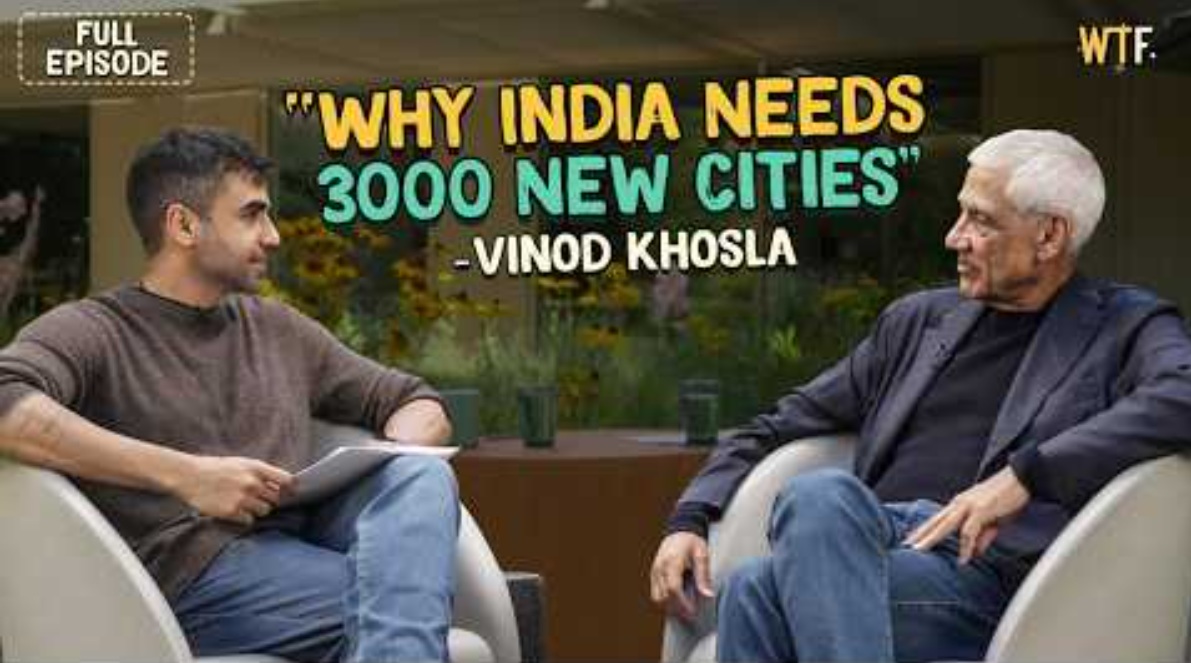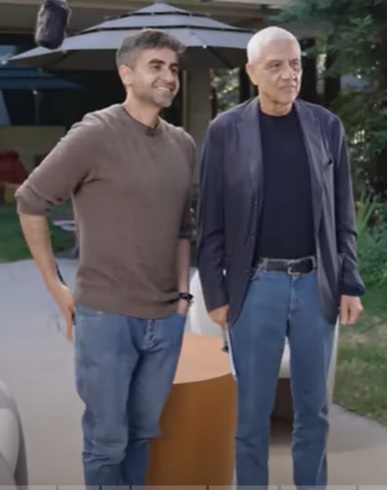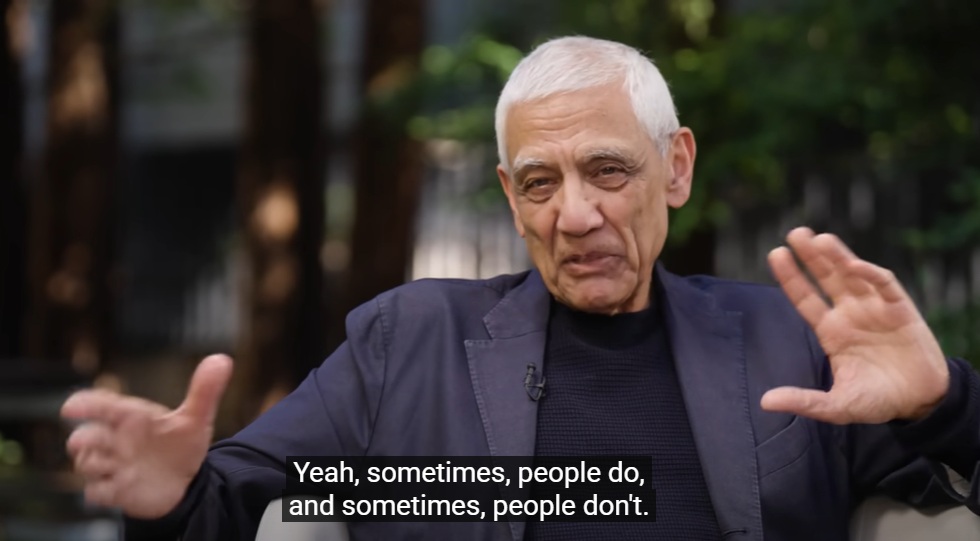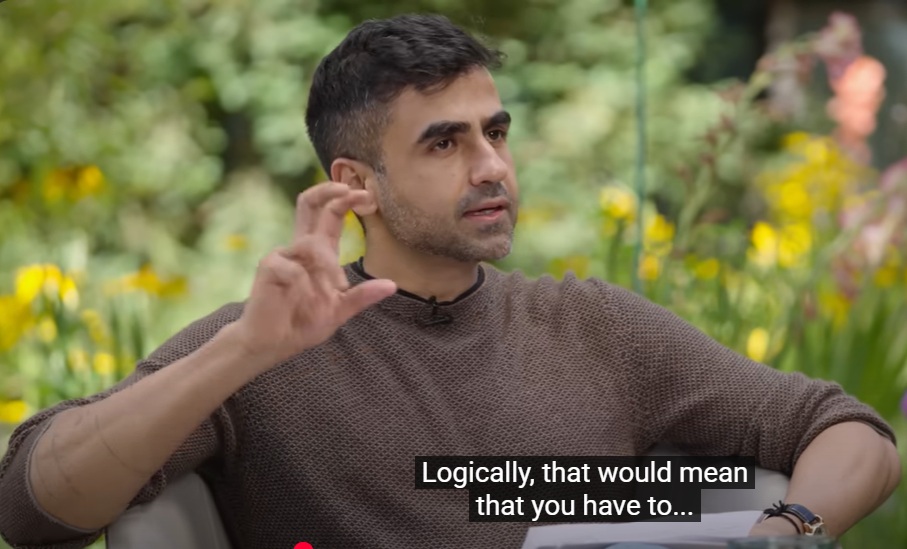Nikhil Kamath Hosts Vinod Khosla on People by WTF

FinTech BizNews Service
Mumbai, August 9, 2025: In a latest episode of 'People by WTF', investor and entrepreneur Nikhil Kamath is joined by legendary venture capitalist Vinod Khosla, Founder of Khosla Ventures and co-founder of Sun Microsystems, for a rare and candid conversation on what it truly takes to build in an age of AI, uncertainty, and exponential change.

Vinod Khosla: College Degrees Are Becoming Useless
From personal stories of rejection to bold visions of a post-capitalist world, the episode is a masterclass for anyone looking to understand the future of entrepreneurship, the role of risk, and why great founders, not just great ideas, will define the next decade.
1. Failures Don’t Stop Bold Builders:
To kickstart the podcast, Nikhil Kamath offers a quick, candid summary of Vinod Khosla’s journey, from an academically gifted IIT Delhi student to co-founding Sun Microsystems, to becoming a contrarian investor who backs bold bets, knowing most may fail. “The most important thing in life is a passion for a vision to make it happen. And then the persistence to make it happen, as you go through the ups and downs.” Vinod shares that his journey has been defined by relentless persistence, even when faced with repeated failures. “Stanford rejected me twice,” he recalls, “I always found a way to come and keep at it.”

2. Skeptics Wait, Entrepreneurs Build Forward:
Nikhil poses a question many young Indian entrepreneurs quietly wrestle with: When chasing long-term opportunities, does one need certainty to succeed? Or is that just a story we tell ourselves? Observing Vinod’s approach through the years, Nikhil asks, “Certainty has been an element of most interviews I've watched. You take the contrarian opinion in a very certain manner. To me, I feel like certainty is not necessarily a good thing, but it's the innate human conditioning. Do you see yourself like that, as somebody who believes in something and makes up his mind and sticks to it?”
Vinod pushes back on the very idea and says, “Certainty is of very little value to me. What I like is a shot at doing the impossible.” For Khosla, building a business, whether as a founder or investor, is never about knowing exactly where you’ll end up. “Skeptics never did the impossible. Skeptics, to me, are always saying why things can't be done.
Entrepreneurs are always saying, “What if something was possible?” he shares, highlighting that contrarian thinking is about envisioning and enabling new possibilities rather than doubting existing ones.

3. Build Without Certainty:
The Elon Musk Way: Khosla notes that the fear of failure often leads to risk aversion and ultimately, stagnation. He says, “One is you don't want to fail, which fundamentally means you don't want to take risks, which fundamentally means you're not going to do anything new. And that's a perfectly reasonable thing to do, and people get comfort in that certainty.” For him, possibility is the true driver. Referencing Elon Musk and Juniper Networks, Vinod notes that transformative innovations often happen despite expert opinions or established industry norms. “Elon Musk created the electric vehicle, almost went bankrupt a few times in doing it, but he followed his belief there and then made the world happen. I don't believe we'd have electric cars dominant today, be 25% of all car sales in California today, if Elon hadn't made that world happen.”
4. Careers Aren’t Linear Anymore:
Nikhil poses a practical dilemma: in a world where adaptability is key, how should a 22-year-old today decide where to begin his career? Vinod offers a grounded and refreshingly simple perspective: “It almost doesn’t matter where you start.” He emphasizes that the real value lies not in the specific field or job, but in developing the ability to learn and adapt continuously. “Keeping your lens zoomed out for the widest angle is sort of the way to think about how you should go about your career.” Vinod encourages young professionals to begin wherever their curiosity leads, but to stay adaptable, think in systems, and develop a mindset that grows with a changing world.
5. Be A Generalist, Not A Specialist:
When Nikhil sums up Vinod’s advice as “don’t be a specialist, be a generalist,”
Vinod fully agrees and emphasizes that in a world driven by rapid technological change, especially AI, adaptability and broad learning are far more valuable than deep specialization in a single field. Vinod underscores this with a clear insight: “The people who don’t know how to use AI will be obsoleted by people who know how to use AI first.”
6. Optimize Careers For Change, Not Stability:
Nikhil asks Vinod for guidance on making career choices today, where Vinod offers a direct and future-focused perspective. “We’ll see more change in the next 15 years than we’ve seen in the last 50.” Vinod says, highlighting how AI is set to transform nearly every profession. He predicts that within the next 3-5 years, AI will be capable of performing 80% of most jobs, leaving only a few exceptions due to regulatory or social constraints. He highlights traits that define successful entrepreneurs across domains, first principles thinking, resilience through volatility, and above all, the ability to learn fast. “If they are fast learners, they'll adapt to the world as it changes. And that may be the most important characteristic of an entrepreneur,” he notes. “You have to optimize your career for flexibility, not a single profession.”
7. The Real Scarcity Isn't AI, It's Great Entrepreneurs:
Nikhil poses a compelling question: if AI is democratized, won’t all entrepreneurs converge on the same solutions? Vinod sharply disagrees: “Almost certainly, the people who only think a year out will be obsoleted by the people who think, what do I want to build in five years?” he says. He stresses that it’s not access to AI that will set startups apart, but the human choices that shape how AI is used. “People selection or team building will become the most important characteristic where the AI technology is democratized, if you believe it's democratized.” In an honest observation on the startup ecosystem, Vinod cuts straight to the core of what truly matters: “The single most important decision an entrepreneur makes is whose advice to trust on what topic. I think the shortage today is not of technology or capital.” Looking ahead, Vinod forecasts a radically lean future: “Sometime in the next 10 years, we will see a company with a billion dollars of revenue that has only 10 employees.”
8. Capitalism in the age of AI:
Vinod expands on the idea of AI-powered public services, especially in a country like India. He imagines a future where AI provides free or near-free education, healthcare, legal services, and financial advice, delivered at scale through government-backed platforms, and considers these points as critical while investing in his portfolio company, Sarvam AI. “If every child in India has a free AI tutor… it’ll be better than the best education a rich person can offer,” Vinod explains, highlighting how AI could level the playing field across sectors once limited by wealth or privilege. “If I was PM Modi, I’d be doing everything I can to get those as common services,” he says.
9. Healthcare reimagined:
During the conversation, Vinod delves into how AI-driven expertise can make vital services like medical advice, legal help, and education nearly free and widely accessible, especially benefiting underserved areas such as rural India. This shift presents a huge opportunity for governments and entrepreneurs to transform access and quality of care and learning. He elaborates, explaining, “Imagine if medical expertise was free. Every doctor was free. I wrote about the fact that a village in India will get better cardiac advice, cardiac care, than I can get at Stanford, because Stanford will still in 15 years have their cardiologists, and in the village, there'll be AI. Almost certainly true. But the software-based services that depend on expertise, personal lawyers for everybody, personal tutors for every child or adult, the personal medical care advice...half the economy could be covered in almost free services from the government. And to be honest, I would love to do that in India. It's such a no-brainer.”
10. Markets May Wobble, Technology Marches On:
In a reflective close to their conversation, Nikhil asks Vinod whether, amid all the optimism around AI and technology-led disruption, there’s a risk of overestimating the pace of change, suggesting we might already be in a bubble. Vinod notes, “Almost certainly there will be a bubble, or we are in one. I do think we will see a collapse in valuations.” but stresses that this doesn’t diminish the long-term opportunity.
11. Hold Equity, Not Debt:
When asked about the future of money, Vinod highlighted a long-term shift towards a deflationary global economy, likely starting sometime in the 2030s. “Money will be worth a lot less,” he said. His advice for entrepreneurs and investors: “Hold equity, not debt. Hold equity, not cash. Or real estate, not any other asset class.”
12. The next disruption and why old tech won’t survive:
Vinod Khosla shared a pragmatic view on crypto and blockchain, distinguishing between their speculative and functional uses. He sees blockchain-based innovations like stablecoins, software contracts, and decentralized services as inevitable. “Every economy should have a stablecoin.
There are lots of good uses for the stablecoin. But there are lots of bad uses. The problem is, the bad uses prevent the good uses. And so stablecoins currency mechanism is better than speculation.” He emphasized that while bad uses dominate headlines, technologies like stablecoins can make banking and legal processes far more efficient and affordable. “The Indian government should issue a stablecoin, and Aadhaar would be a great system to anchor it.” he suggested.
Looking specifically at India, Khosla was direct about the future of its $200-billion IT services export industry: “BPO as a business will disappear. Software IT services will mostly disappear, or transform radically.” He pointed out that while some incumbents are adjusting incrementally, surviving this shift will require bold, non-incremental moves. If I can do a system integration service for one-fifth the cost, the customer will always take one-fifth modular trust," he said, underscoring the urgency for India’s IT services firms to reinvent themselves in the AI and blockchain era.
About the People by WTF podcast:
People by WTF is a compelling series where Nikhil Kamath engages in candid, thought-provoking conversations with trailblazers from diverse industries across the globe. From business and technology to sports, entertainment, and policy, each episode offers rare insights into the minds of those redefining success. Through deep dives into pivotal moments, hard-earned lessons, and bold perspectives,
People by WTF challenges conventional thinking and inspires audiences to push boundaries. This podcast is your gateway to transformative ideas, whether you're a business leader, entrepreneur, or someone eager to refine your skill set. Past guests include Indian Prime Minister Narendra Modi, Bill Gates, Nandan Nilekani, Ranbir Kapoor, and Kumar Mangalam Birla.